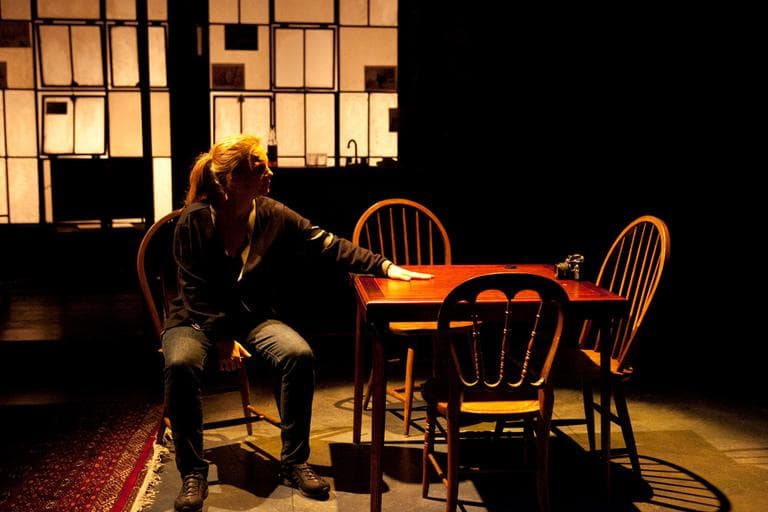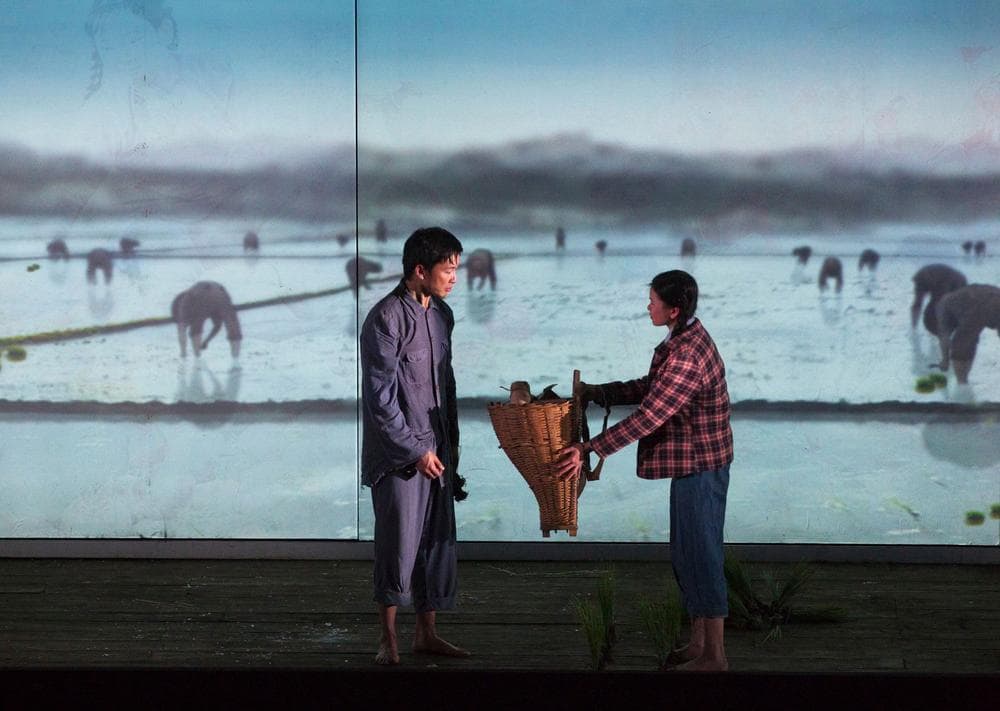Advertisement
Stick To What You Know

Sometimes novelty isn’t all it’s cracked up to be. While it’s admirable that companies reach out to different audiences and expand their boundaries geographically, the most satisfying night out can be the modest, well-made play.
That’s certainly the case these days in the Boston area, where the Lyric Stage Company of Boston’s "Time Stands Still," focusing on two journalists back from the Iraq War, trumps more ambitious productions.
'Wild Swans' Falls Short
Based on Jung Chang's bestseller, “Wild Swans” (at the Loeb Drama Center through March 11) tells the story of three generations of Chinese women suffering from the oppression and deprivation brought on by one political system after another, from feudalism to communism. The co-production by the American Repertory Theater and a couple of English-based groups, the Young Vic and Actors Touring Company, falls short.

The production looks terrific, with five striking tableaux of life in China, but the story itself is much too limited in scope. While the book traces the sins of the feudal lords, Japanese and Nationalists — all of whom paved the way for Mao’s excesses — the 90-minute play just focuses on the Communists, so not only do we lose that sweep, but it takes the rise of communism out of historical context.
The story about Mao’s transgressions is not all that unfamiliar and the acting isn’t anything to write home about either. I think what they needed to do was follow in the footsteps of the theatrical version of “Nicholas Nickleby” and capture the epic nature of the story in a two-part production. Obviously that would have been a huge commitment of time and money, but this miniaturization just doesn’t work.
A Pilot Episode For The Stage
“Blood Rose Rising” (at the Davis Square Theater through April 7) has a different problem. It’s the first in a series of "episodes" in a ghost story centering on a young teacher who inherits his father’s creepy Boston house where he falls in love with the ghost who’s haunting the place. He also has a relationship with a mover and shaker on the local political scene.
Writers Ben Evett and Steven Barkhimer are taken with the popularity of some of the better episodic television series — many of which have drawn on America’s better playwrights. The hope is this is a genre that will draw a younger audience to the theater.
Based on the audience on the opening weekend they’ve succeeded at that, partly by casting some of the best young actors on the small and fringe theater scene in Boston. The design and special effects are also eye-catching, but the Evett-Barkhimer script is riddled with Oedipal cliches and over-declamatory exposition. Would a teacher who was just verbally assaulted by a student pour his heart out to her about his youthful traumas with the Magic Eight Ball?
Advertisement
Nevertheless, the group of young folk filing out in front of me were eager to come back for Episode II sometime down the road.
The Good Life?
More experienced theatergoers will find greater riches, and better sight lines, at the Lyric Stage Company of Boston. “Time Stands Still” (through March 17) is a play by Donald Margulies, who won a Pulitzer Prize for “Dinner With Friends.” This, his latest play, kind of follows in its footsteps, as far as two couples debating what constitutes the good life these days — commitment and danger or personal comfort and security.
The recent deaths of journalists covering the unrest in the Middle East make this story all the more poignant.
The woman, a photojournalist, was almost killed and her boyfriend, a foreign correspondent, had a nervous breakdown, so it’s not quite cut and dry. Maybe they just want to enjoy Netflix and, well, dinner with friends. (The recent deaths of journalists covering the unrest in the Middle East make this story all the more poignant.)
The other couple is their editor and his age-inappropriate event planner, so you would think that Margulies is stacking the deck in favor of the journalists. But he’s too good a playwright for that, as witnessed by the event planner’s confrontation with the crusty older woman over journalistic ethics.
The play isn’t about Iraq as much as personal ethics. How do we balance commitment to others, whether in a relationship or what we owe people who are suffering in other countries, against our personal desires? There are no right answers here, but the food for thought is pretty delicious.
The production is first-rate. Scott Edmiston is one of the city’s best directors and the ensemble is quite good, particularly Laura Latreille as the photojournalist and Jeremiah Kissel as the editor.
The Big Picture
Of course, not all plays are created equal. “Photograph 51” tries to set the record straight about Rosalind Franklin’s vital contribution to the discovery of the double helix structure of DNA. Unfortunately, Anna Ziegler, the playwright, doesn’t do much beside that.
The Nora Theatre Company’s production at the Central Square Theatre (through March 18) boasts a smart Janie E. Howland set — she also designed “Time Stands Still” — that highlights the monastic nature of scientific lab work. The play itself is a tedious trek through the historical record of Franklin’s work circa 1953 vis-a-vis that of James Watson and Francis Crick, who went on to win the Nobel Prize with Franklin’s boss, Maurice Wilkins.
It doesn’t help that Franklin was something of a cold fish and brought many of her problems on herself. But in order to balance the proceedings Ziegler makes Watson a shallow, lecherous, anti-Semitic thief. And Crick isn’t much better. Worse, Ziegler doesn’t do any of the work that went into works drawing on science — like “Copenhagen” and “Arcadia” — that make the subject matter vital to life outside the laboratory. “Photograph 51” needs enlarging.
This program aired on February 24, 2012.
